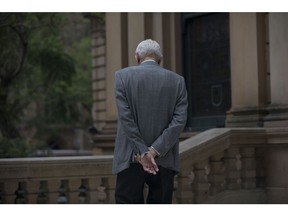Article content
(Bloomberg) — One of Australia’s largest pension funds, A$88 billion ($58.8 billion) HESTA, has added to growing pressure on Mineral Resources Ltd. to act further on governance concerns surrounding founder Chris Ellison, its management and board.
The fund has put the company on its watch list, which means it is subject to closer monitoring, and has been engaging directly with it regarding its recent governance failures, HESTA Chief Executive Officer Debby Blakey said in a statement Friday. HESTA remained disappointed with its response so far, she said.
Article content
Ellison will step down as managing director within 18 months, the company announced Monday, after an internal probe into undeclared payments to an offshore company he owned found he had engaged in “profoundly disappointing” conduct. Shares are down about 17% since news of the governance issues broke last month.
“Our concerns include that the managing director’s succession timeframe does not reflect the seriousness of the issues and that the issues identified indicate a systemic failure of governance at the senior management and board level,” Blakey said. Mineral Resources declined to comment.
The fund is Mineral Resources’ 13th largest shareholder, holding 0.92% of stock, according to data compiled by Bloomberg. The company joins Woodside Energy Group Ltd. and Santos Ltd. on HESTA’s watch list.
The Australian Securities & Investments Commission said Thursday it had launched a formal investigation into the company and Ellison’s actions, local media reported. Meanwhile, ratings agency Moody’s on Thursday cited corporate governance issues among its reasons for downgrading its outlook on the company to negative from stable.
Article content
Raphael Arndt, chief executive officer of Australia’s sovereign wealth fund, earlier this week said that the issues raised were serious and the Future Fund had asked for more information on Ellison’s conduct, local media reported.
Proxy firm ISS has recommended shareholders reject the company’s remuneration report at its Nov. 21 annual meeting, citing “material corporate governance concerns.” It said in a report that other directors may need to resign if “they are found not to have acted with appropriate independence and in shareholder interests.”
Proxy adviser Glass Lewis has called for the naming of the “three additional executives implicated in the governance issues alongside Chris Ellison and former Chair Peter Wade.”
Subscribe to The Bloomberg Australia Podcast on Apple, Spotify, on YouTube, or wherever you listen.
Ellison did not act with integrity when he financially benefited from Mineral Resources’ payments made to companies owned by him, the miner said in a filing Monday. He was fined A$8.8 million by the company and will forfeit his salary and other incentives worth as much as A$9.6 million.
Article content
The investigation found Mineral Resources had made payments of A$3.8 million to an offshore company owned by Ellison for mining equipment and parts. Ellison had not declared the income and the transactions took place after Mineral Resources had been listed in Sydney, raising questions over the transparency of the deals. He has agreed to repay the amount.
The miner’s probe also revealed the company had been paying rent on properties owned by Ellison along with other rent-related financial benefits to his daughter. On occasion, he also used company resources and staff for work on his private boat and properties, and to manage his personal finances.
Blakey said HESTA will consider voting against director elections, supporting or filing shareholder resolutions, or possible divestment where the fund considered there wasn’t adequate evidence of progress to address risks.
—With assistance from Paul-Alain Hunt and Ben Westcott.
Share this article in your social network

